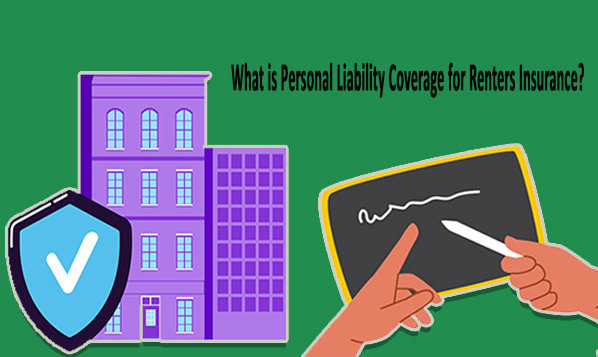Personal liability coverage is a crucial aspect of renters insurance, safeguarding policyholders from financial losses arising from legal obligations. This policy safeguards renters by requiring them to be held responsible for any mishaps, injuries, or unintentional property damage caused to another person on their rental property.

For example, personal liability insurance covers medical expenses, legal fees, and repairs in case of injury to a visitor or property damage to a neighbor. This safeguard makes sure that unforeseen circumstances don’t result in crippling debt. It is a fundamental component of a well-rounded renters insurance policy, and renters who need complete protection against unanticipated hazards must comprehend its function and extent.
What Does Personal Liability Coverage for Renters Insurance Cover
Personal liability coverage for renters insurance pays for other people’s losses, damages, and injuries when you are at fault. Additionally, you may be held accountable for harm or damage brought on by pets or other family members, such as kids, who live in your home.
The following are what personal liability coverage for renters insurance typically covers;
- Injuries to others: This includes accidents that happen in your apartment and injuries that you (or a family member) unintentionally cause.
- Damage to other people’s property: can include a fire that started in your flat and spread to a nearby apartment or unintentionally damaging a friend’s possessions.
- Legal fees: are covered if you are sued for covered damages or injuries.
Limits on personal liability insurance coverage are important to take into account when thinking about particular incidents. The coverage limits of the majority of renters insurance policies begin at $100,000, which means that any lawsuit or claim that exceeds this amount will not be paid. Furthermore, you can pay a greater premium to expand your coverage if you think it is insufficient.
What Does Personal Liability Coverage for Renters Insurance Not Cover
Renters’ personal liability insurance usually has restrictions and limitations that should be understood. Typically, this kind of coverage excludes:
Business activity
Your personal liability insurance will not cover claims for damage or loss if you operate a business or side gig out of your flat. To safeguard your company, you’ll need a different commercial or business coverage.
Damage and injuries are intentional
You will have to pay for repairs and potentially legal fees out of pocket if you purposefully shatter your neighbor’s window because you’re angry with them.
Personal injury or damages
Personal liability insurance does not cover damage to personal property or injuries to you or your household members. You can get a separate renter insurance policy to cover the damages. However, a deductible and various coverage limits are usually applied to those claims.
How Much Does Personal Liability Coverage for Renters Insurance Cost
Renters insurance costs an average of $173 annually for $15,000 in personal property coverage, including additional living expenses and personal liability. Your renters insurance premium may vary based on several factors, such as:
- Your region.
- Residence type.
- Claims history.
- Coverage amount.
- Policy deductible.
- Dog owner.
Does My Landlord’s Insurance Policy Protect Me
Landlord insurance, sometimes referred to as rental property insurance, can cover harm or damage in cases where the landlord is held legally responsible. For instance, your landlord’s insurance coverage ought to take effect if your visitor trips and falls on the stairs due to loose boards. However, a landlord’s policy would not cover the issue if your dog bit a guest’s leg. Additionally, theft or damage to your personal belongings is not covered by a landlord’s insurance coverage.
How to Choose the Right Renters Insurance Policy
Here are helpful hints on how to locate the best deal if your landlord or property manager mandates that you get renters insurance:
Assess your requirements for coverage
Determine the value of your personal belongings and look for any possible liability risks. Determining the required liability and personal property coverage will be simpler if this is done.
Shop around from various insurance providers
To evaluate coverage options and costs, get quotations from many insurance providers. This method might assist you in finding insurance that respects your budget while maintaining necessary coverage.
Examine customer feedback
To evaluate the insurer’s standing in terms of customer service claims handling and general dependability, look into customer reviews and ratings.
Evaluate the deductible
Choose a deductible that, should a claim arise, you can afford to pay out of pocket. Generally, a greater deductible lowers your premium but raises the initial expenses of submitting a claim.
Ask about any discounts that may be available
Inquire about possible savings, such as those for having security systems, bundling policies, or keeping a claim-free record. Additionally, your rates may be reduced by these savings, which would make it more affordable.
Consult an insurance agent
Consult an insurance agent if you are unsure of your options; they can provide you with guidance that is specific to your requirements and circumstances.
Final Thoughts
A vital component of renters insurance is personal liability coverage, which covers against unanticipated events and legal action. By paying for expenses associated with other people’s property damage or bodily injuries, it provides financial stability. Policyholders must comprehend the extent and restrictions of personal liability coverage. This is to make well-informed judgments on their insurance requirements. Therefore, renters must understand exactly what they are covered for.

